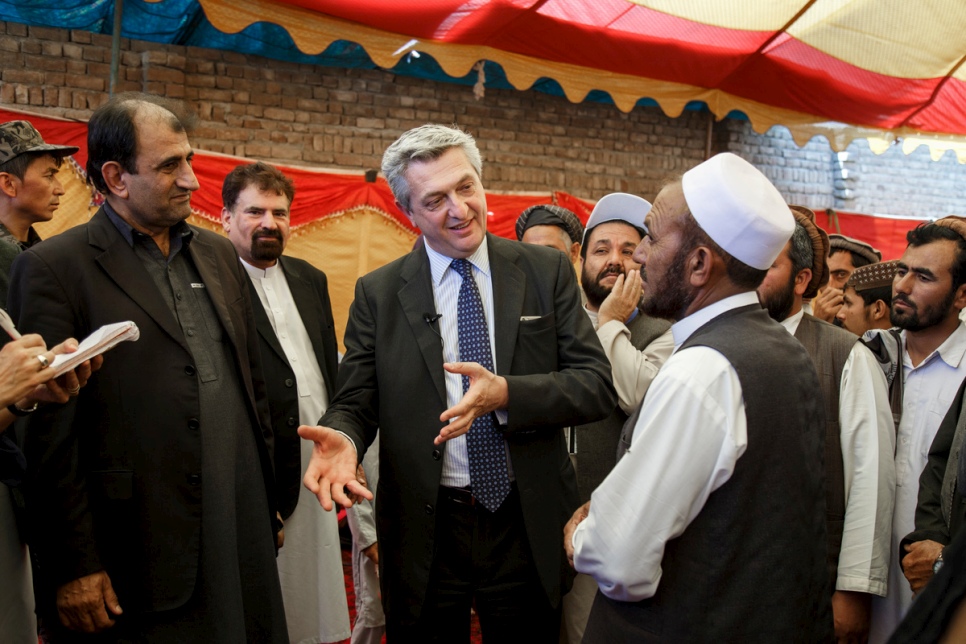UNHCR chief laments world focus shifting away from Afghanistan
Mounting world refugee crisis sees international community lose sight of Afghanistan and the plight of millions of its people.

UN High Commissioner Filippo Grandi answers questions from internally displaced people in Kabul. © UNHCR/Jim Huylebroek
GHAZIABAD, Afghanistan, June 20 (UNHCR) – Faced with a mounting world refugee crisis, the world is losing sight of Afghanistan and the plight of millions of its people, the United Nations High Commissioner for Refugees declared today.
Speaking on the occasion of World Refugee Day, High Commissioner Filippo Grandi said: “Unfortunately the attention of the international community seems to have slipped.”
“There are still millions of Afghan refugees abroad and 1.2 million internally displaced (IDPs). The purpose of me being here today is to remind the international community of the importance of solving this problem.”
His audience in this poor mud-brick town just outside Kabul was made up of some of the most recent victims of Afghanistan’s troubles. Bearded Pashtun men who last year fled Nangarhar province in the east in the midst of fighting sat listening.
They are among more than 380,000 IDPs driven from their homes in 2015.
The world must pay more attention to the Afghan crisis.
More than 1,000 families came to Ghaziabad, where near and distant relatives took them in, offering housing and food. The overburdened town now needs help. The IDPs can find little work. Health care for them is minimal. Water is a problem.
Grandi said UNHCR would help the government and contribute to the digging of 14 new water wells for the community.
“When we came last year, we felt alone,” Dr. Zahir Shah said. He was the spokesman for the IDPs. “Now that you are here, we cannot say we are still alone.”
The High Commissioner’s message, in meetings with IDPs and with the country’s president, Ashraf Ghani, and its Chief Executive Officer, Abdullah Abdullah, has been constant: The world must pay more attention to the Afghan crisis.
Afghans constitute the second-largest refugee population in the world, and hundreds of thousands among them have been in exile in neighbouring Pakistan and Iran for decades.
Since 2002, 5.8 million Afghan refugees have returned to their home country. But Grandi, on his first visit to Afghanistan since becoming High Commissioner in January, underlined a new problem brought on by renewed conflict.
“The number of people returning from Iran and Pakistan has dwindled dramatically in the past few years,” he said.
“We simply do not have the option of turning our back and walking away.”
UN High Commissioner for Refugees Filippo Grandi
Afghanistan’s growing problems have contributed to the alarming rise around the world in people displaced by conflict and war.
Their number now stands at 65.3 million. Of these, 40 million are IDPs, like the people in Ghaziabad whom Grandi met.
That means that one in every 113 persons in the world is forcibly displaced. That is a population bigger than France.
Grandi said that without a solution to the Afghan displacement crisis, there is a big 'missing piece' in the rebuilding of the country, which risks being overlooked by the international community. Not only must the world see and understand the plight of these people, he said, it must do much more to help find solutions.
“We simply do not have the option,” he said, “of turning our back and walking away.”
